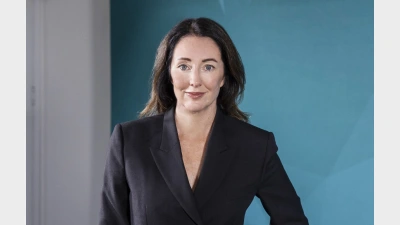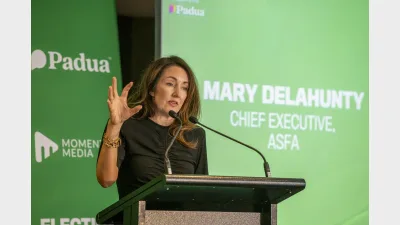Competition heats up in superannuation custody


Custody has long been regarded as an unglamorous but necessary part of Australia’s superannuation equation but, as Damon Taylor reports, the big custodians are finding themselves in an increasingly competitive environment.
Like all financial services, Australia’s superannuation industry has been hammered by the global financial crisis (GFC). Yet the constant throughout this crisis has not been the impact of market volatility or the impact of restraints on liquidity. Instead, the constant has been competition.
Competition between super funds and between the industry’s service providers has become a way of life and, according to Jane Perry, chief executive officer of J.P. Morgan Worldwide Securities Services Australia & New Zealand, that fact is something custodians are acutely aware of.
“The GFC hasn’t had an impact on the fundamental business of providing a robust custodial and administration service,” she said. “It has, however, had an impact on the behaviour of the underlying superannuation funds.
“Funds have had other more pressing issues to deal with (ie, declining values, member communication, etc), which has meant that the appetite for change in custodial providers hasn’t been a priority for the trustee,” Perry continued. “So the pressure on custodians hasn’t increased per se.
“At its core, the industry is still all about robust execution and the GFC hasn’t substantially added to that — it’s really ‘business as usual’.”
Perry said what had changed as a result of the GFC had been the points of service at which custodians could add value.
“It’s in the types of requests received from clients during these turbulent times,” she said.
“We have noticed an increase in requests for additional transactional data (counterparty, etc), but also requests for us to unlock some business intelligence behind the transactional data, increasing the data transparency for clients.
“Competition continues to be fierce, but that isn’t a recent phenomenon,” added Perry. “New service providers are entering the market because the Australian growth story is so compelling.
“We are in the incredibly fortunate position of having one of the most advanced national savings policies in the world and, as such, are regarded by many as the ‘poster child’ for the global pension industry — corporations recognise that and want to be part of the story.”
GFC aftermath
Without trivialising the impact of the GFC, Richard Coia, head of master custody for National Australia Bank Custodian Services (NCS), said Australia had survived the crisis remarkably well and that, in most cases, the superannuation custody business remained unchanged.
“We’ve been to a number of conferences recently and the message around the GFC is that although investment markets have been hit hard, it hasn’t been that bad in Australia,” he said. “We’re still the lucky country when compared with the United States or the United Kingdom.
“The panic in the market was well founded, but Australia came through it relatively unscathed, and that flowed down to custodians,” Coia continued.
“There were certainly challenging times as clients pushed for savings and additional revenue streams from their custody service, but at the end of the day, our business remains solid and fundamentally the same.”
Coia said many superannuation funds had used the financial crisis as an opportunity to get their house in order with respect to custody.
“There’s been a lot of activity around risk management frameworks, due diligence, business security and counterparty risk,” he said. “And while NAB’s custody processes have stood the test of time, there’s been a need for us to focus on proving that to our clients.
“We’re now seeing people get a lot more active as they get into the business of doing business,” Coia added.
“There are a lot of new business opportunities out there and funds are looking for different things from their custody, but in saying that, we have a lot of new products with which to respond.
“All in all, we’re fairly optimistic about the future.”
Having observed similar responses in other custody clients, Ken Shaw, head of coverage for BNP Paribas Securities Services, said the financial crisis created a need for greater confidence in the security of super fund assets.
“The whole focus is on confidence and security,” he said. “And in turn, BNP Paribas Securities Services is focused on supporting its clients and delivering those needs to them.
“Our slogan and motto is ‘the closer, the better’,” added Shaw. “And it’s fundamental to the way we do business.
“If we’re close to our clients and close to the market, we can combine our tax expertise, our compliance expertise and our investment transaction expertise and support them in the best possible way.”
Competition and consolidation
Yet increased competition has sideline consequences that have little to do with an increased level of service to super funds and superannuants.
In superannuation custody provision, consolidation has long been a by-product of that competition, but according to Lachlan Allardice, head of sales and account management for ANZ Custodian Services, it is a constant theme.
“Consolidation within Australian custody is always a discussion point,” he said. “And the presence of global players in this market means there are always whispers about people staying in or getting out, but it’s an ongoing issue.
“Realistically, there may never be that balance point.”
Agreeing with Allardice’s sentiment, Coia said industry commentators had been talking about competition and consolidation for a number of years.
“But despite the talk, everyone seems to sustain and hang on to the point where we haven’t seen an exit in years,” he said. “All the usual competitors are still strong, and that’s a great thing for the customer.
“It keeps everyone honest and it maintains innovation,” Coia continued. “From our perspective, it’s all well and good to be one of the biggest custodians in the market, but our culture remains one of determination and hard work.
“We’ve come through the GFC well but it wasn’t due to any sort of luck. It was the result of good business practice and a diligent business model.”
Taking an alternative tack on the consolidation debate, Perry said in a fiercely competitive environment, those custodians best placed to service funds in global investment would survive and thrive.
“Given that Australia represents such a small percentage of the investable universe, short of parochialism, most future investments are going to be cross-border in nature,” she said.
“There are only a few global custodians who have the necessary experience to partner with superannuation funds to facilitate their global investment in over 90 markets.
“Local expertise is, however, critical, and that is why it is imperative that when selecting a custodian, superannuation funds first ensure their custodian is truly global and, secondly, ensure that the custodian is its own local agent in Australia,” Perry continued.
“This eliminates the majority of the market participants, but we believe it’s a critical component of our success and the success of our clients.”
Perry added that Australian super funds were among the most sophisticated pension funds in the world and that they were constantly looking to leverage global best practice.
“They need support because the larger of our super funds are competing for assets with the best and biggest institutional investors in the world,” Perry said.
“So while size and scale are important ingredients for longevity and success, the real differentiator today is global reach and the ability to offer clients a breadth and depth of tailored product.
“Consolidation is set to continue and that means that current providers of custody will continue to assess whether or not its provision remains a core capability.”
Client needs
Of course, custody provision isn’t focused on super funds alone. Custody mandates cover the spectrum of financial services and for Shaw, it is vital that custodians understand the differences that exist within their clients’ requirements.
“BNP Paribas has two distinct segments to their Australian custody business in asset managers and asset owners,” he said.
“We have dedicated teams, a client service manager and a relationship manager specialising in each segment and, on top of that, accreditation specific to each industry within each segment’s staff.
“It’s a model that enables good support for our clients and good operation of our service across both market segments.”
According to Perry, while a traditional custody approach may have segmented custody provision to super funds and asset managers, rapid development in both areas of the market has meant that service adaptation is increasingly possible.
“Custodians have historically specialised in servicing either superannuation funds or asset managers,” Perry said. “And traditionally, the servicing of asset managers has required a different set of product and skill sets.
“However, over the past five years the increasing sophistication of Australia’s pension industry and savings environment has driven change in both segments,” she continued.
“And in response, custodians have been very enterprising.
“They have been able to adapt their service models to either customer segment or a subset of that segment, as required.”
Perry pointed out that while custody was often looked at as a commodity service, its importance in the superannuation transaction dictated a far more important role.
“When you buy a commodity service, the provider you select isn’t an important consideration,” she said.
“But any notion of custody being a commodity service is blown away when one sees the level of care and diligence involved in the selection of a custodian.
“The custodian is the foundation upon which the superannuation fund is built and, as the entity that ‘holds the money’ for the end investor, the selection warrants serious consideration.”
A broader focus
Irrespective of the type of client is the focus all custodians are now being asked to place on corporate governance, risk management, transparency and the security of both their clients’ assets and reputation.
So while the GFC may have brought these issues into starker contrast for super funds and asset managers, Coia said they were already firmly on custodians’ agendas.
“In the last eight years, a great deal of what we do has needed to be in the context of a risk management framework,” he said.
“It’s a framework that’s been robust and for good reason.
“Super funds have felt that pressure as well, but a lot of what custodians do has insulated them from the more arduous requirements,” Coia added.
“It’s a huge part of the business now and it’s well embedded and well entrenched.
“The simple fact is that custodians cannot service this market without it.”
Shaw said he had also seen risk management and corporate governance become more important for all clients, but superannuation funds in particular.
“Remember that super funds have to satisfy a significant number of stakeholders in their boards, trustees, regulators and members,” he said.
“Corporate governance reporting requirements have increased in both frequency and level of detail and our responsibility has been to ensure that we have appropriate resources in place with which to meet those demands.
“But it is equally important for us to ensure that our own governance is at strong levels,” Shaw continued.
“So we engage external auditors to ensure that our internal governance not only meets Australian standards but exceeds them.
“After so recently witnessing events such as the Lehman Brothers bankruptcy, corporate governance has stepped up and all clients are looking for confidence in the security of their assets.”
Yet for Perry, attention to detail with respect to custody corporate governance is also about reassuring clients.
“Clients need to be comfortable that their appointed custodian not only helps them meet all the necessary legislative and regulatory requirements, but that they are also an extremely well-run business,” she said.
“The custodian needs to continuously demonstrate a depth of leadership and subject matter expertise.
“At J.P. Morgan, we regularly demonstrate to clients at service reviews that good corporate governance is the cornerstone of all we do.”
Reporting
However, while a strong focus on governance, transparency and risk management may have been in evidence before the GFC, its more immediate consequence has been a demand from super funds for increased reporting.
Now more than ever, funds want detailed information on their asset holdings, their liquidity position and their investment performance, yet the message from Shaw is that this is something conscientious custodians were already providing.
“This kind of reporting demand already exists in Europe and the United Kingdom,” he said. “So as a European custodian, we’ve seen a lot of it already.
“The GFC may have prompted a greater focus, but we already have a complete set of reporting tools capable of meeting this sort of demand,” Shaw continued.
“We can offer a full range of risk analytics, information on asset allocation holdings and the development of risk budgeting to name a few, and we have 200 people worldwide supporting it.”
Shaw said with respect to BNP Paribas’ reporting tools, the GFC did not prompt change or addition to their existing functionality.
“What we’ve seen come out of the GFC has been around transparency and the security of assets,” Shaw said.
“Clients, whether they are super funds or asset managers, want to know that their assets are being held securely.”
Not surprisingly, security seems to be a common theme for custodians at the moment. No one can deny that the GFC has necessitated a lot of changes within superannuation, but it seems custodians stand ready to support and reassure their clients through what remains of this crisis and into the future.
Reflecting on what change the financial crisis has prompted in superannuation custody provision, Allardice said he had seen few requests for additional service.
“We take our direction from the super funds in this,” he said. “And at present, we’re not seeing any great push for greater service solutions.
“Our focus is always the ongoing service of our clients and, to that end, we constantly ensure that we are staying engaged and, most importantly, that we understand their needs and continue to meet them.”
Yet asked whether it was a case of ‘business as usual’ for custodians, Shaw’s response was an emphatic negative.
“The biggest changes coming out of the GFC have been with respect to transparency, risk management and the timeliness of information,” he said. “And with those issues as a constant theme, clients will continue to push boundaries.
“Personally, I don’t believe there is such a thing as ‘business as usual’ anymore,” Shaw continued. “This is an industry that is continuously evolving. With upcoming tax changes and an increased focus on transparency, reporting and risk management, custodians will need to adapt quickly.
“But at the end of the day, the custodian’s primary role is the safekeeping of assets, and in that, it is never business as usual.”
Recommended for you
Rather than retreating in the face of rising volatility and geopolitical uncertainty, superannuation funds are tactically positioning themselves to capitalise on equity market weakness, prioritising liquidity and flexibility to make strategic buys.
The CEO of superannuation advocacy body ASFA has laid out the sector’s expectations for Australia’s next government, underscoring the need for policy stability to safeguard members’ retirement savings.
Aware Super has made a $1.6 billion investment in a 99-hectare industrial precinct in Melbourne’s North which, the fund clarified, also houses the nation’s first privately funded open-access intermodal freight terminal.
ASFA has affirmed its commitment to safeguarding Australia’s retirement savings as cyber activity becomes an increasing challenge for the financial services sector.













